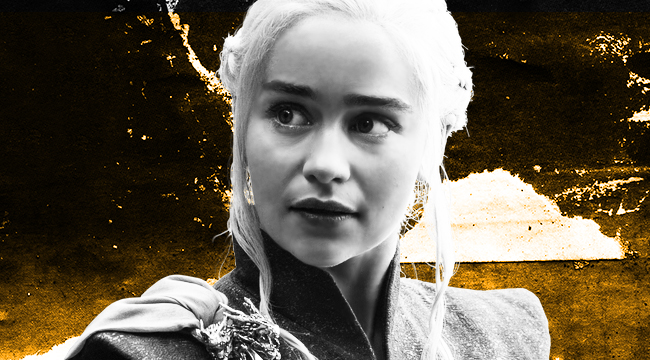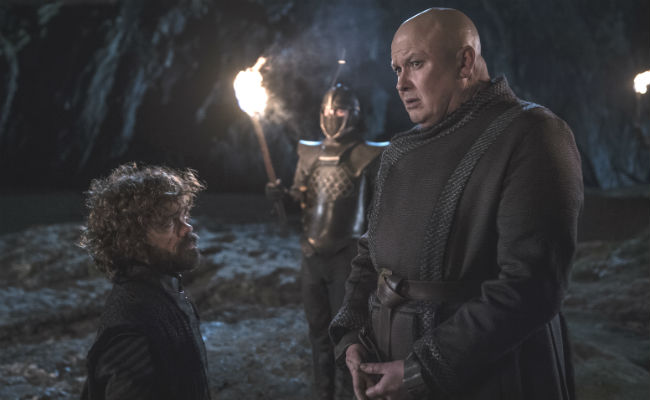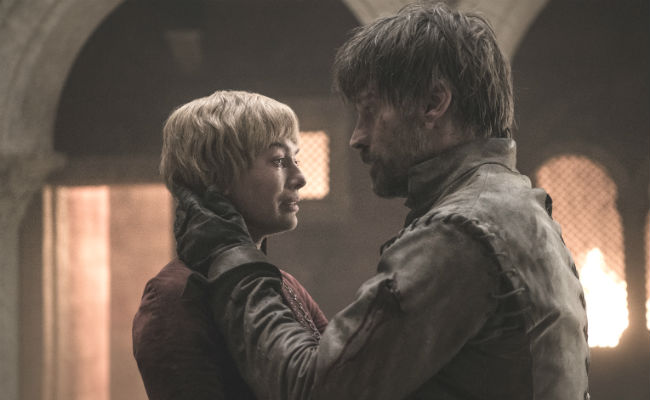
The final season of Game of Thrones has gained plenty of ire from fans over what’s being viewed as questionable creative choices.
Creators David Benioff and D.B. Weiss, adapting the series from George R.R. Martin’s fantasy novels, have spent seven seasons spinning story webs, weaving plot threads together to join fan-favorite characters in the show’s final season. The HBO series is considered one of TV’s most influential prestige dramas, earning a massive following, garnering awards for its superb performances and epic battle sequences, and when it began its swan-song run, it seemed it might go down in television history as one of the greatest shows of all time.
And it still might, but it won’t be because of how its writers chose to have it end.
Few shows as adored and grand of scale have been able to stick their metaphorical landing but Game of Thrones is burdened with even greater responsibility – to wrap up a decades-in-the-making storyline that has yet to be finished by its original author. GRRM has been famously slogging through the final chapters in his A Song of Ice and Fire series with the show having gone “off-book” seasons ago.
There was a noticeable difference between seasons adapted directly from Martin’s work and the creators’ own imaginings, but season eight has not only bungled its six-episode farewell, it’s thrown it into a raging fire.
Currently, the show’s last handful of episodes has earned a 73% critic’s score on Rotten Tomatoes, with episode five’s “The Bells” pulling in a grim 53% rating on the review aggregation site. That’s a sharp decline from the show’s previous seasons, but even without those numbers as proof, a quick glance at social media after the show airs will confirm that even the most diehard of fans are struggling to understand why they show they’ve loved for nearly a decade has suddenly become unfamiliar, and worse, unrewarding.
But the writing might have been on the wall a lot sooner than we thought.
In a brilliant Twitter thread detailing GoT’s plot woes this season, University of Connecticut professor Daniel Silvermint theorized as to why Benioff and Weiss seem to be faltering so spectacularly. Weiss and Benioff convinced Martin to hand over the rights to his work over lunch in Los Angeles years ago after they correctly guessed who a main character in the books (Jon Snow’s mother) was. Martin made the decision to trust them to adapt the books into a show for TV.

So Benioff and Weiss always knew how this game would end, which meant they were working towards something and had a finite amount of time to get there. As Silvermint explains, Benioff and Weiss, by nature, are plotters. They’ve been constructing a house with a blueprint when it came to Martin’s work, they had the bare bones of where the story would go, and they had a fully-fleshed out ending. The problem is that what drew us to the series wasn’t necessarily its endgame but its storytelling capabilities. Martin hooked fans through intricate world-building and meticulous attention to detail, giving his characters full autonomy over their own stories, often explaining that the reasons for entire novels and delays in those novels was because Martin is what’s known as a “pantser,” lit-slang for an author who enjoys writing by the seat of his … you get it. “Pantsers” are notorious for meandering through their stories, putting so much effort into creating fully-rounded characters with rich pasts and letting the story “choose” where it wants to go that the stories have trouble reaching an ending point. It’s why Martin has added more installments to his series and struggled to finish the damn thing. He’s kept adding to character arcs that push the action to expand further and further until he’s left trying to join together branches of plotlines that have seemingly grown out of control.
The problem with this final season comes, as Silvermint notes, because we became invested in Martin’s character work, but we relied on Benioff and Weiss to give us a satisfying conclusion. The two men aren’t the character-driven creators Martin is, which is why we’ve seen problematic arcs amongst so many of our heroes. Benioff and Weiss knew where they needed to be in the end and delivered the plot twists needed to get there. They’re gifted when it comes to crafting sweeping battles and story-propelling treks beyond the wall because they know how each will fare, but putting in the intimate work of justifying their protagonist’s paths to close with earned evolutions and downward spirals? That’s not the show they’ve been writing for quite some time.
Silvermint’s initial assessment is right, in a way. Benioff and Weiss have never been able to fully grasp Martin’s character work, but they’ve also fallen victim to a familiar failing of TV shows today: blockbuster syndrome. Blockbuster syndrome occurs when showrunners describe episodes as mini-movies when creators brag about each series being one, long big-screen feature. They, however subconsciously, favor packing as much action and spectacle as possible into shorter time-frames, condensing storylines and delivering fast-paced plots into digestible binge-watches. GoT has always had shorter seasons than other dramas on TV, but for the show’s final run, it cut its already low number of episodes in half, promising to wrap up years of world-encompassing story arcs in just a few hours. The reason could be financial, in part due to the big salaries commanded by its now-celebrity lead cast, but for whatever reason, the choice by Benioff and Weiss to truncate the show’s finale is exposing their “plotting” weaknesses.
By putting themselves in a sort of escape-room, story-wise, where they have a finite amount of time to figure their way out, Weiss and Benioff have sacrificed character growth to reach the finish line. They’ve rushed arcs, had heroes make uncharacteristic choices, renege on promises, fumble prophecies, and created a show that feels alien from the one we began with. They’ve forced Daenerys Targaryen, their established savior, to go mad and become the show’s surprise villain. They’ve reduced Jon Snow, their male hero, to something of a hollow shell, stumbling hopelessly around battlefields (and somehow surviving) and making numerous poor decisions. They’ve given us red herrings, delivered a truly-disappointing death to their most brilliant antagonist, transformed knowledgeable, likable supporting characters into naïve fools, and concocted some enraging surprise deaths. They’ve reached the “oh shit” moment so many writers face, but seem to have shackled themselves so securely to a deadline that they have no way of earning a satisfying conclusion. Perhaps even worse, Benioff and Weiss seem so worried about pleasing fans, they’re adding to the chaos of multiple character assassinations by servicing fan theories in troubling ways.

For instance, it’s quite probable that Benioff and Weiss knew how Jaime Lannister would die earlier in the show’s run. Perhaps they didn’t know it would be when the Red Keep fell on him and his sister, Cersei, but they knew Jaime would be killed off and who he’d be killed off with, which meant they knew Cersei and Jaime would be together in the end. Now, the creators probably didn’t expect for fans to begin shipping Jaime and Brienne of Tarth seasons ago, they might not have even given thought to where Brienne would end up in the final season, but they decided to include a romantic subplot between the pair anyway, teasing fans with a pairing only to have Jaime revert to his bad habits.
Maybe Weiss and Benioff wanted to reward viewers with a fanfiction-style victory, joining two beloved characters briefly before getting back to their regularly scheduled programming, but doing so compromised one of those characters while destroying the redemptive promise of the other. Thanks to Weiss and Benioff, Brienne ended the show as a weeping woman, scorned by the man who took her virginity, wailing in a housecoat as he left to be with his sister. And Jaime finished as a truly confusing character, a man who sacrificed everything to save innocents, but claimed to be apathetic about the imminent deaths of his own people. Jaime closed as a man who jilted his closest friends and family to return to a toxic relationship that cost him so much. These actions might’ve held weight, or at the very least, made sense, if the show had devoted more time to explore the complexities of their relationship, but because of the fewer episode limitation, the way both will be remembered is a disappointing disservice to who they once were.
The same can be said of so many of GoT’s most powerful players. Dany’s descent into madness, Jon’s reluctance to the throne, Sansa’s strangely-motivated subterfuge, Tyrion’s complete loss of cleverness, Varys’ betrayal, Cersei’s ineptitude, etc. — so many grand plots have been thwarted because the landing was rushed.
Game of Thrones is still an impressive show, and its final season, no matter how disappointing, still features some moments of great television. It will survive the butchering of its final act. But for frustrated fans trying to patiently make it to the finish line while hoping for the best, perhaps understanding why everything feels so unfamiliar might make the act of enduring a frustrating final season more bearable.






